Peace Babies, Generation Yes and the End of Britain
A brief New Year series of posts where I expand on the six themes laid out here and give some more detail. Here looking at some of the generational forces and demographics driving the break up of Britain.
For the past ten or twelve years the independence movement in Scotland has seen itself as the lead or most advanced part of any one of the nations that might cause the break-up of the British State. We were in some ways the most developed and the most articulate in putting the case for independence, or so we thought. Another way to look at these relations, in the light of the foundering of part of the project north of the border, is to look at the wider cracked edifice of the UK. The idea is to look at ourselves with less self-regard and instead look at the whole of the UK and Ireland. To look less at a binary Scotland-England relationship and more at the wider systemic constitutional failing.
The cracks and fissures of the Union lie from Inverness, currently trying to rid itself of its Earl, down south to Dundee, the city that voted Yes and bristles with potential (even if it is overshadowed by its urban big brothers). From the Tay across the Debatable Lands – that strange territory that coughed up Alister Jack and down south to Liverpool and across to Snowdonia. Wales is a new front on the constitutional question, where years of economic neglect, cultural appropriation and social disregard have fed a political movement that less than twenty years ago wouldn’t have been treated seriously.
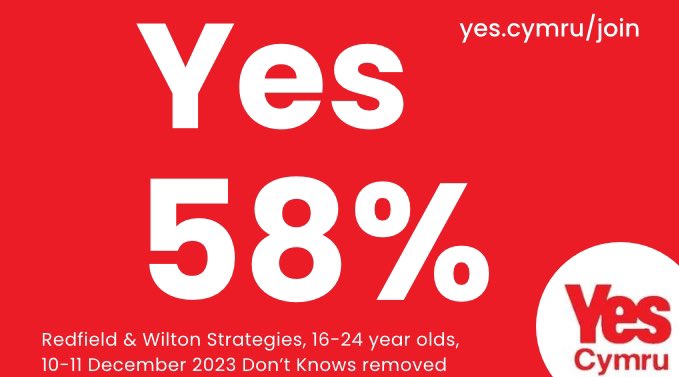

Across the Bristol Channel and out across the Irish Sea to Wexford and up the east coast to Dublin we go where we face the high probability of Mary Lou McDonald becoming Taoiseach. Again, such a thing to say twenty years ago would have been unthinkable. In Belfast, the DUP is playing electoral electoral hara-kiri.
For the most of 2014 and beyond – the SNP and most of the independence movement wouldn’t talk about Ireland, less it ‘frightened the horses’. But as has been said many times before the days of keeping the horses calm have long since gone and the shifting sands of constitutional change do not wait for permission from Gordon Lamb House. As Emma DeSouza wrote last year (‘Why would we want to be part of the UK?‘), the Welsh figures (above) are mirrored in Northern Ireland:
“A recent Lucid Talk/Sunday Times survey showed that 57% of 18 to 24-year-olds in Northern Ireland would vote “yes” to reunifying Ireland if a border poll were held today, despite there being no official campaign or unity plan in place. More than 600,000 people have been born in Northern Ireland since the signing of the Good Friday agreement, and they have grown up during a sustained period of peace that has given rise to a new set of priorities. This is a generation that wants more rights, more progressive change – and to confine the division of the past to the dustbin of history.”
As DeSouza explains Jeffrey Donaldson’s recalcitrance has made a rod for his own back: “The DUP has enabled a stasis in which Northern Ireland’s devolved assembly has been non-operational for 70% of the past six and a half years, and repeatedly blocked attempts for more devolved government. This has forced many younger people to advocate for constitutional change as it feels like the only route to a functional political system.”
Unionism in the North’s stance of always saying ‘No’ – always being the brave opponent to change – always being the staunch defender of whatever – worked in the era when they had an eternal conflict and a majority on their side. In an era of relative peace – in which something akin to ‘normal politics’ is struggling to find its way – these old tactics are completely redundant and alien. Finding peace has benefitted nationalists and progressive forces in Ireland.
The Big Three Factors Driving the Break-Up of Britain
There are at least three other factors, or variables, driving the break up of the UK, or the acceleration of the break up of the UK. All of these, interestingly, play particularly badly with younger people, the Yes Generation here, the Peace Babies in Ireland. The first is the ongoing consequences of the Brexit settlement, (‘a cohort of older, middle-class, grievously nostalgic voters demanded Brexit, and they got it’). The second is the prospect of a Starmer government, and the third is the ongoing crisis in the Royal Family of the individual formerly known as Prince (Andrew).
The Brexit fallout has ongoing repercussions in Scotland where it remains a democratic sore, a reminder that we were told in 2014 that “the only way to stay in the EU was to vote No” (I think by Colonel Davidson). But it’s not just the democratic deficit of Brexit (you’ll remember that (as @williemillersm1 has pointed out): “Both Labour and the Tories insisted separate Brexit deals were impossible, entirely excluded Scotland from the process and used it as an excuse to hamstring devolution. Then went about negotiating bespoke arrangements for NI, Gibraltar, and the City of London.”
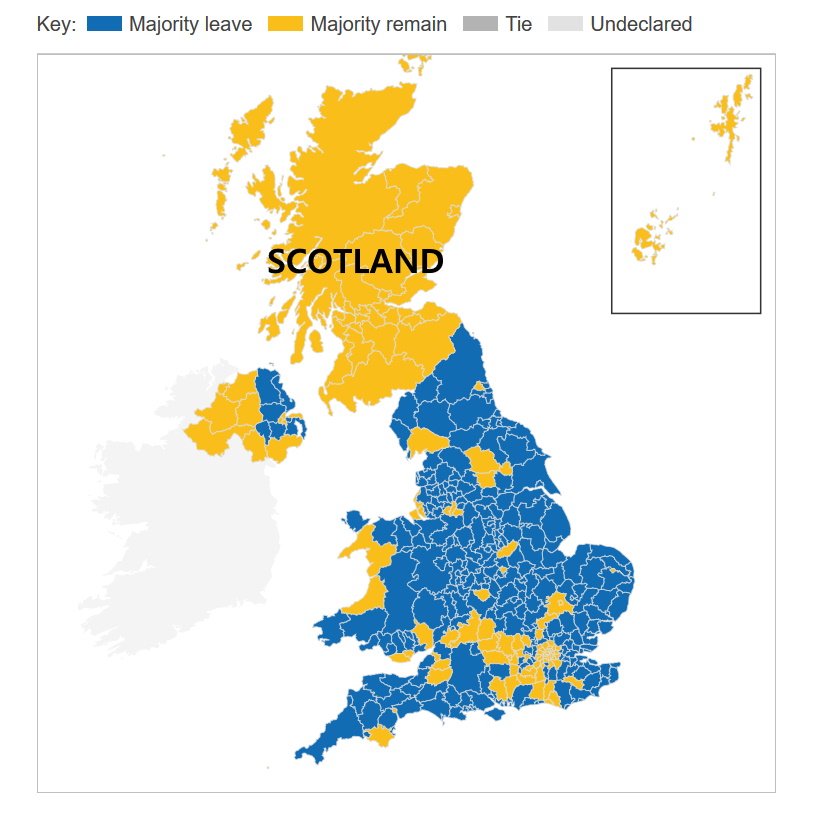

It is the Brexit result that has undermined devolution more than anything with the creation of the ‘internal market’ and the clawback of powers to Westminster. Those on the left who hate the EU and have been cheerleaders for Brexit populism can’t ignore that our removal from Europe is a major driving force for people supporting independence, but more than that there is a lack of any real tangible benefit for Scotland from being removed against our will from both the EU and the huge European Single Market …
‘Have you heard anything positive about Brexit for Scotland?’
Watch @STVColin interview @RuthDavidsonMSP at Tory party conference in Birmingham. pic.twitter.com/vyVbAQ5wO6
— Dan Vevers (@DanVevers) October 1, 2018
The Brexit settlement (despite ironically the DUP’s duplicitous role in achieving it) is what is stymieing the Northern Ireland Assembly functioning and is another element that makes up for a generational dimension to the British crisis. Young people are excluded from free movement, ease of travel and education, and the Erasmus programme by a political phenomenon they voted in huge numbers against.
The second factor is perhaps counter-intuitive, but the expectations built upon the incoming Starmer government have the united commentariat in a gleeful froth, particularly north of the border. The story is this. Labor are back, Scottish Labour is back. It’s back to basics. Bread and Butter issues. The Nationalist Fox has been shot (again). Normal order has been resumed. We can forget about that unfortunate last decade as if it didn’t happen at all. But putting such great expectations onto the shoulders of such a figure as Keir Starmer and his programme is deeply problematic for the media class and their supporters in politics. As Liz Loyd writes (‘The path to independence is longer than the SNP would like – but it will lead there in the end‘):
“The belief that Scotland should be independent is a sticky one. Continued high levels of support are not just a consequence of Brexit or Boris Johnson, but a mark of a longer-term evolution in the underlying thinking of the Scottish population. Importantly, that is not unique to those who voted 10 years ago. Two-thirds of under-25s, all of whom were too young to vote in 2014, support independence. Equally, the enthusiastic young voters of 2014 have not become significantly more pro-union or conservative as they have entered their 30s. For them and many of the under-50s who consistently produce a polling majority in favour of independence, two ideas have been normalised: first, that Scotland should be independent; and second, that patience is a virtue.” She continues:
“For new young voters, the belief that Scotland should be independent is now the prevailing norm. The idea strikes a chord with a generation growing up in a political context that gives them more confidence in Scotland and less in the UK. A change of UK government may temper support for a while, but unlike previous generations of Scottish voters, this generation will always know there is an alternative.”
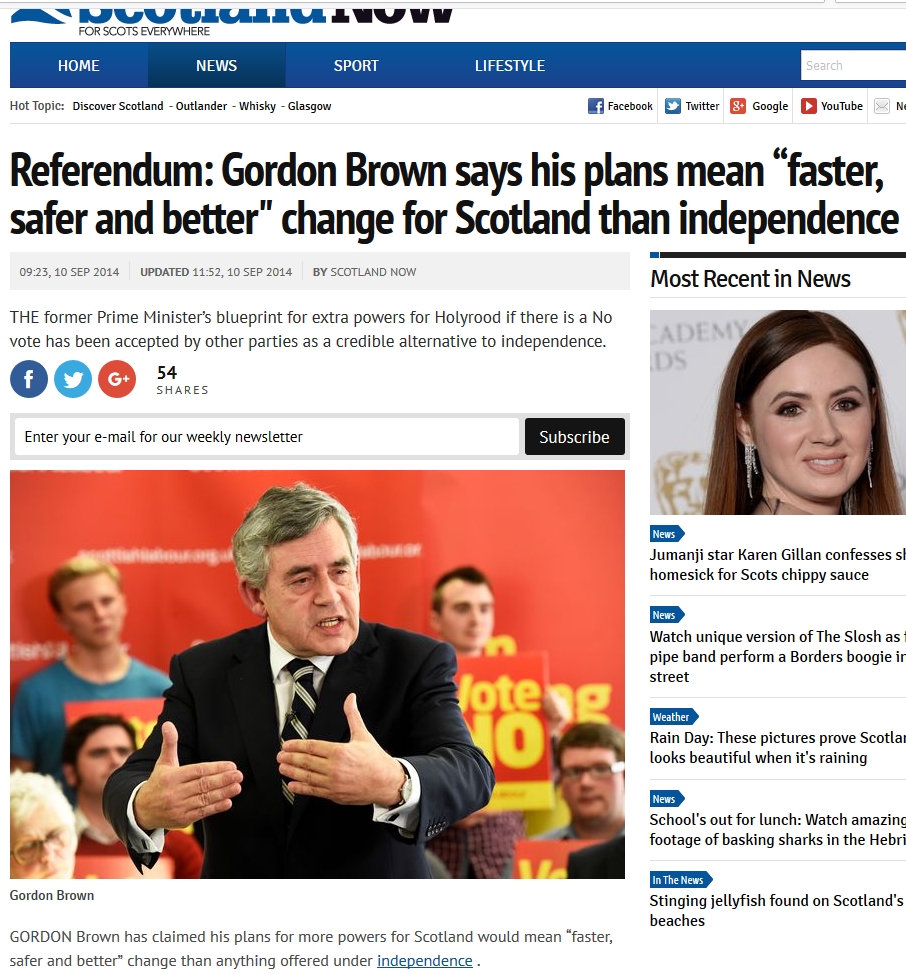

In editorial after editorial, in column after column, our writers and gatekeepers tell us the same message: Labour is coming and will deliver for Scotland. Today it promised us – like a child – a ‘seat at the table’.
Labour MPs will give Scotland ‘a seat at the table’ in Westminster, Anas Sarwar has said https://t.co/uD2HAmuC9u
— Holyrood magazine (@HolyroodDaily) January 8, 2024
This is Labour’s dilemma, if it succeeds (as looks likely) in winning across SNP voters to vote for them for the first time, or to return to them, it will have to deliver. But the ‘change’ movement that it claims looks distinctly blurry. Not a day goes past without Starmer or his team explaining bravely what they won’t do, what they can’t deliver, and what they can’t promise. The stagnant and festering decline of the Conservative government (s) is a powerful motivation to vote for an alternative, but the prospects for change of the scale required to meet our social, economic, ecological, and constitutional crisis seem dim at best.
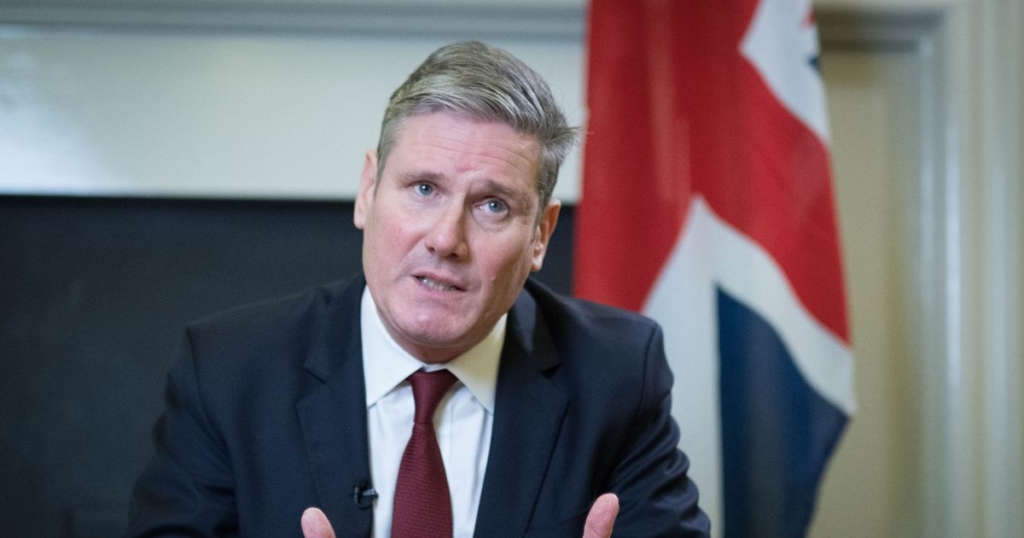

The third and final driver for the break-up of Britain may seem less obvious than the previous, but it is a story that is being unsuccessfully suppressed by pliant media. The ongoing fallout of the new batch of unsealed documents relating to Jeffrey Epstein has devastating consequences for the royal family which we are barely beginning to take note of. With the removal of the useful side-story of Harry and Meghan to detract attention from Prince Andrew’s past, the new revelations have pushed Andrew back into the glare. Reports are that he is squatting in the Royal Lodge – and that he is ‘devastated’ at being named in newly published court documents linked to the pedophile Jeffrey Epstein and has locked himself in a room as the fallout grows.
You might think this salacious or a sideshow but it is more important than the tabloids – and the Royal Broadcast Fluffers – would have you think. While it’s all couched as titillation and gossip the political consequences are ignored. The residual goodwill for the monarchy in post-Elizabethan Britain has evaporated as recent polling out this week shows support for the monarchy has dropped below 50% for the very first time:
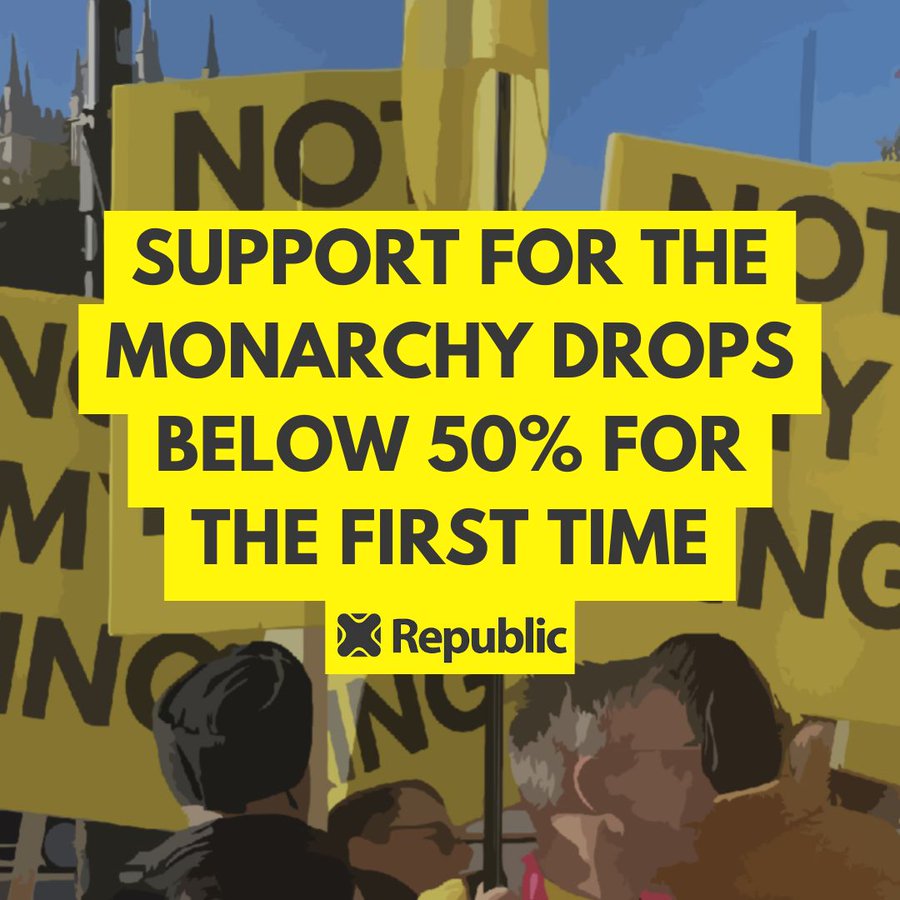

Again there is a generational dimension to these changes. Young people have no loyalty or faith in Charles, Camilla or Andrew – and there is no ‘folk memory’ (however contrived it was) of World War Two and the Blitz to protect them. Much of the respect (or toleration of the monarchy) was bound up with the individual of Elizabeth and bound within a deferential society that has gone. As the royal historian and commentator Ed Owens points out: “An important poll from Savanta showing growing disaffection with monarchy. While influenced by recent news re. Andrew, there’s a deeper downward trend at work here, especially among GenZ & Millennials.”
Owens has said: “There’s no way back for Prince Andrew despite recent efforts to rehabilitate him. The court documents released this week again highlight how unsuited he is for public life. The king must act now and exclude him permanently.”


That’s not going to happen. Instead, we will have the Prince in the Tower glowering away until such time as further revelations expose his involvement further. The significance of this is hidden behind the way the tabloids frame the narrative as tittle-tattle and red-top fodder: ‘Randy Andy’ and ‘Harry the Nazi’ and endless coverage of Piers Morgan’s feud with Meghan. The political is excluded. But speaking for Republic, who commissioned the poll, Graham Smith said today: “This is huge. Royalists have spent years saying the monarchy has the support of the country. That’s clearly no longer the case.”
Significantly too the Savanta poll shows the monarchy is rapidly losing support, with fewer than half in all age groups under 55 preferring the royals.
So here we have three major factors driving the Break-Up of Britain, each with its own generational aspect: the Brexit debacle which young people opposed; the Starmer government which promises to do nothing and the collapse in support for the monarchy which in previous times acted as a social-cultural glue to unite people. In this respect a key aspect of the ‘United Kingdom’ has gone.
Perhaps there will be justice for Andrew and it will all go away. Perhaps everyone will forget the promises of constitutional change (‘blueprints’) made by Gordon Brown then quickly dropped. Perhaps Brexit will come good and we will enter the Sunlit Uplands soon? Perhaps the DUP will see sense and Stormont will re-convene?
All is possible if extremely unlikely.
What I think is less likely if not impossible is for the incoming Starmer government to meet the needs and demands of young people facing a dire housing crisis, problems in education (access and cost), the reality of the cost of living and the exploitative and precarious gig economy. Nor are there any signs of Starmer’s government confronting the existential threat of the climate crisis that haunts the younger generation like none before.

All your points are absolutely on the money. The inability of UK/Westminister to act is an absolute , they can’t even see the trends. Slowly but surely the under 55’s will carry the day, and they will bring a sizable chunk of over 55’s who will find disillusionment in what they have supported.
Superb.
I agree with most of this however it has to be set against the immense damage that an incompetent (using the mildest of terms here) Scottish Government has inflicted on Scots’ self confidence.
And your evidence for “Incompetence “ over devolved areas is??? All governments can do good by the people who elect them, or badly. If you are getting your information from the Tory unionist press, perhaps you have missed some good news. Exaggeration and pejoratives have no place in making rational political decisions. Weigh all the evidence you can and vote for the least worst option.
Schools, healthcare, ferries, and the rest
Failed to close educational attainment gap.
Hasn’t met children’s mental health targets in 8 years.
Has never met the 95% target for cancer patients being treated within 62 days.
Wasted £250,000 on an unwinnable indyref2 court case.
Spent £1.5 million per year on civil servants preparing for an unwanted indyre2.
Misled parliament over Salmond inquiry.
Botched Scotland’s census and went £27 million over budget.
Failed to meet woodland creation targets.
Cut Rural and Islands budget in real terms.
Failed to deliver a new Agricultural Bill.
Closed the Firth of Clyde to fishermen without consultation.
Failed to roll out R100 superfast broadband for rural Scotland.
Broke manifesto promise to invest £25 million into rural housing.
Overruled 46% of all planning decisions from local councils since 2017.
Missed target of building 50,000 affordable homes by 2021.
Failed to finish transfer of welfare benefits powers, despite 2020 target.
Failed to complete dualling of A9.
Failed to meet emissions targets three years in a row.
Failed to meet annual peatland restoration targets.
531 habitats and 603 species in Scotland in poor condition.
Biggest timetable cuts in 30 years after nationalising ScotRail.
Failed to commit to dualling A96.
Abandoned plans for national energy company.
Cost of Ferguson ferries reached £338 million – 3.5 times over budget.
Ferguson ferries six years overdue.
Ferguson Marine ferry bid given preferential treatment in tendering process.
Failed to upgrade A83 Rest and Be Thankful.
Saw Fire Service response times get worse every year.
610 fewer police officers on our streets.
Violent crime at highest level since 2014.
Scotland’s economic growth lagging behind England.
Scots’ disposable income lagging behind England.
Alcohol-specific deaths up by 13%.
Drugs deaths more than doubled since 2014.
Nursing and midwifery vacancies tripled.
Full-time GP numbers down by 5%.
Worst A&E waiting times on record.
Delayed discharge at record levels.
More than 750,000 people on NHS waiting lists.
More than 1000 schools not inspected for 10 years.
First teacher strikes in 40 years.
Fewer schools than in 2014.
Police investigating £600,000 of missing SNP donations.
Fewer primary school pupils meeting expected numeracy and literacy levels.
Presided over exam fiasco which saw poorest kids have their results marked down.
Nae wonder Nicola bailed!
Yup, it’s shit being in the Union, with a pretendy government which gets pocket-money, in a system designed to deliver failure.
If only there were a different way to run things. Still, mustn’t grumble.
Indeed, Wul; the establishment needs to change. Making the Scottish government independent of the UK government will do nothing to change the whole matrix of official and social relations within which power is exercised in Scotland.
No wonder you don’t leave a name, just a number. What a bizarre list. Strike out all the NHS-related items for a start, because hampered though it is by 14 years of Tory budget cuts, Scotland’s NHS is still the best performing of the four. Education – ditto. The rest is the usual gripe. Remember also that Scottish Water is NOT presiding over rivers and seas full of sewage in order to fill shareholders’ pockets.. unlike all the English privatised water companies.
Having lived outside the UK for the last year or so, the UK has lost all international respect. You may not realise, if you live in it, how bad things are but when I visited, briefly, for a family occasion I was shocked at the deterioration compared with other countries. I have also been in Ireland in the past year, both North and South, and do not recognise the gloom-mongering. The sooner Scotland leaves and starts capitalising on its international reputation which is still, miraculously intact while the UK is Clownville, the better. If Malta can go it alone, so can Scotland. Anything is better than drowning in a fascist cesspit while scrabbling for the crusts from the kleptocrats’ table.
I appreciate that the Scottish government has been constrained in the amount of revenue it can raise. All governments are so constrained. But the Scottish government’s incompetence is evident even in its performance in distributing the revenue it has been able to raise. I blame its focus on bureaucratic process rather than practical outcomes for this; the bureaucratic processes through with it manages (and, some might say, micromanages) out public affairs is a huge drain on the limited resources it has available to it.
I live here, so I clearly don’t know how bad things have gotten. Nor do I know how much respect Scotland still commands on the international stage since its imperial decline. (Who but the ex-Scots of the so-called ‘Diaspora’ takes any interest in the parochial squabbles on an archipelago on the north-west edge of Europe?)
Notwithstanding my ignorance, however, things will not get much better than they are without systemic change. Making Scottish government independent of UK government won’t result in the systemic change required. The Scottish establishment is already making sure of that.
Excellent article Mike. You have brought a ray of hope to this sad old optimist. The other point to consider is that among the younger generation there will surely be a sufficiently talented pool to ensure that the Scottish Government will deliver on all fronts. I remember being very impressed by the 12-14 year old members of the Elite East Lothian Swimming squad in discussions before the referendum in 2014. They challenged all of us as to our position and in their debating the quality was excellent. No yah boo sucks, like Westminster and the Express, Mail etc., but cool rational debate and courteous acknowledgement of opposing views. Again, thanks for a considered article which has cheered me enormously
Bill
At the signing of the Good Friday Agreement some of us did wonder what would happen if the Unionists were to lose their majority in the Assembly. I guess we know now.
Ireland is not the strong independent example as you seem to think it is.. it is as trapped by EU diktat as any other small EU country.
Sinn Féin’s apparent popularity is beginning to look less certain. Although the two main parties are looking totally inffectual.
20% of republic’s population was born outside of Ireland, and the high levels of immigration and lack of housing is beginning to bite the Irish establishment. Sinn Féin Was tipped to win the 2025 election, and to dominate in the North. However, the increased young, very liberal non-religious new city based members are beginning to upset the generally older and rural mostly-staunch Catholic members who are unhappy with the level of immigration, such that the two parts are beginning to pull apart. So much so that Mary Lou McDonald is starting make “concerned” noises about immigration in an effort to stop defections. Within 12 months Ireland won’t look so good.
Then there’s Wales. Wales, like England voted to leave the EU, and recently the lefty-liberal politics is beginning to test the patience of the population. Again immigration is becoming a factor in opinions.
As you observed Scotland is the odd one out. Although it’s noticeable that Scotland, with its 95.4% white population doesn’t really know what immigration is and cultural and housing pressures haven’t been to bite. Good Luck, but be careful what you wish for.
The obsession with looking at how bad things are in England blind you to the uncomfortable realities about Scotland. The desire to break up Britain and rejoin the EU is unrealistic
Then there’s the failing fortunes of Humza and the SNP
I thought Corporal Fraser from Dad’s Army ( ”we’re doomed , doomed ! ‘) was dead – appears he has been reincarnated as SteveH !
@SteveH, which royal have you picked to front your projected militaristic coup? It would have to be one currently out of favour, I guess, with appeal to the rape-positive armed forces you’d likely draw upon. I mean, you have to swear allegiance to somebody, so who will it be?
Yep, we certainly need to build more houses (and develop greater infrastructure like schools and hospitals) if we’re going to grow our population.
Also, aren’t you confusing ‘non-whites’ and ‘immigrants’? The largest non-native community in Scotland is by far that of people who were born in Poland; the next is those who were born in the Irish Republic; the third largest consists of those who have migrated here from England.
Also, aren’t you catastrophising when it comes to England, where 81% of the population self-identifies as ‘white’, 9% as ‘Asian’, and 4% as ‘Black’, and where this ration hasn’t significantly changed since the previous census in 2011?
Good stuff
I don’t know if the monarchy will make that much difference because those that would be affected largely ignore them.
Starmer and NI however could make a difference. If the Scottish branch office get telt by Starmer or if there’s an independence vote in NI, that will make people think in Scotland.
It will be interesting to see how Scotland votes in the GE – We all used to vote Labour in WM and SNP in ScotGov
Has SLab done enough to make Scotland risk it’s free prescriptions and free uni and our child poverty payments?
Some former Labour voters in Scotland look likely to go back to Labour in next election. Two main reasons:
1.general dissatisfaction with SNP incumbency at Holyrood
2.no expectation of independence being feasible in next parliament .
Recent history shows that Labour at Westminster cannot be more favourable to Scotland without risking losing support in England.
Holyrood election will be real test of Labour revival in Scotland as their policies will then be directly compared to SNP policies on issues you have outlined and Labour will probably have been in power at Westminster for nearly 2 years. Some disillusionment with Labour government will already have begun to set in.
If Labour are successful in Westminster election but stumble in Holyrood one this may lead to real tensions between the Scottish/UK Labour establishment opposed to extending Holyrood powers and independence (Anas Sarwar etc) and those who are more pro Holyrood than Westminster and will favour extending powers and more relaxed about independence (Monica Lennon etc).
‘Pessimism of the intellect, optimism of the will’ Antonio Gramsci
This piece is certainly fits neatly with the second part of Gramsci’s famous motto, perhaps a little too optimistic.
The continuing repercussions for Scotland/UK regarding Brexit do not make good viewing for those who’s central argument is for leaving a social, political, economic union to head for sunny uplands of ‘independence’, it has not worked out that way with EU. Potentially far graver consequences lurk when seeking leaving a much older and deeper union. Indeed, playing out in real time in front of us all is the dangerous consequences of listening to politicians who offer a one-word solution to complex circumstances, whether the word is independence or Brexit. Far from giving the independence cause the final push to victory, the last few years have witnessed the project falter. Still no answers to the questions of trade, borders, currency or pensions, just increasingly intemperate frustration that anyone might have the temerity to return to such trifling details, and increasingly falling back on glib celebrity endorsements from film stars rather than making any serious attempt to make the case for Indy. As Scotland’s dominant political actors run for cover from scandal and failure, (only to be replaced by a new generation who look anything but an upgrade) and then the splits, factionalism and the inevitable hunt for traitors that always infect nationalist politics, hardly seems likely to improve the prospects ergo, the good ship Indy remains in dry dock. The only good news is the polling that shows the cause has not lost any support in the last decade. Interesting that supporters of independence always consider 45% as the floor of their support, never the ceiling, this could prove to be serious miscalculation.
I am old enough to remember when Quebec was the go-to scenario for Scottish Nationalists. For 20yrs the separatists in Quebec controlled the political apparatus, following defeat in a referendum, they went on to lose the second ref when it became obvious following the Clarity Act (2000) that it was not in the material interests of the population to split from Canada, indeed so obvious, that the SNP quietly dropped their interest in North America altogether, and transferred their affections to Catalonia. How is that working out? The disastrous tactics of the Catalans should send a warning to the Indy crowd here, and the situation in Scotland is now unfolding along the lines of Quebec.
The demographic argument in this article that young people (under 26) are in favour of Indy, might give some hope for the future, however in a rapidly aging electorate in increasingly uncertain times it is those retired and heading for retirement that will decide this question for the next two decades. Being old and poor is not an enticing proposition, and that cohort will always err on the side of caution, far from dying off, this demographic will increasingly influence the electoral outcomes going forward.
Starmer’s Labour will almost certainly form the next govt in Westminster, and according to polling evidence is proving a gamechanger in Scotland. The devolved settlement was designed to function with consensus across Scotland and with a similarly consensual relationship with the UK govt. As predicted by many, this albeit informal arrangement has been stress tested to the nth degree when the SG elected in 2007-present is in principle hostile to devolution, and even the official opposition have a similarly ‘principled’ hostility to the very idea of the devolved settlement. Constitutional bun fighting is now the weary spectacle for a Scotland where everything keeps getting worse. A FM pontificating about the war in the Middle East or global warming would be more effective if he could get the bins emptied and fill the potholes. If a Starmer government fails to manifestly improve the economy and public services, supporters of independence may return to the fray in a decade, refreshed and emboldened state, until then Independence looks increasingly like an answer desperately seeking a question.
‘Constitutional bun fighting is now the weary spectacle for a Scotland where everything keeps getting worse.’
Ah; a spectacle, indeed! The constitutional question (and imperial posturing on global affairs such as the conflicts in the Middle East, as if anyone in the world gives a sh*t about what a First Minister of Scotland thinks) has been used since the birth of nationalism to distract the public from more important social and political issues and government failings.
The British royals are the organised crime family which has captured the British state. Much of British and pre-British history has featured the battles between and within such families. The British Empire has been a centuries-long crime spree. Once these crimes become accounted for, very likely within an international context supported by domestic pressure, the nature of the system (ever more geared to avoiding accountability at the top) becomes evident.
Perhaps a perceived lack of, or falling away of, foreign respect for British loyalty in lands whose cultural products we most import had something to do with a desire for cultural insulation which may have influenced the Brexit vote. Although curiously I also believe that frustration at many areas of policy being outside electoral influence played a significant part: yet those policy areas are more typically covered by domestic royal prerogative not EU mandate.
If the UK human population decide that Brexit was largely about the Royals, not themselves, ‘taking back control’, then this may lead to disaffection even among British traditionalists as their cognitive dissonance grows. It is, after all, in the very area of foreign policy that the British electorate is especially powerless (and now they have lost a voice in Europe too):
https://en.wikipedia.org/wiki/Royal_prerogative_in_the_United_Kingdom
should read: “foreign respect for British *royalty*”
This also applies to some quite trenchant critiques of British imperialism where the British are (quite historically accurate) villains in the historical blockbusters of India, China, the USA and other nations. Where British cultural exports, like Doctor Who (apparently to be taken up by Disney), could tell the world a British view of its own imperial history, they are silent. A guilty silence? A complicit silence?
Devolutionism
Ram it up your hoop
Ram it up whose hoop Jake?